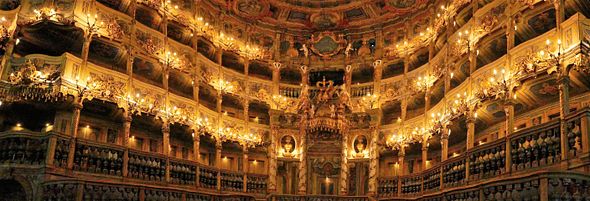Apologies to
![[livejournal.com profile]](https://www.dreamwidth.org/img/external/lj-community.gif) theatrical_muse
theatrical_muse and
![[livejournal.com profile]](https://www.dreamwidth.org/img/external/lj-userinfo.gif) fandom_muse
fandom_muse people; not only did I have a very busy week past, but as I'll be in England from tomorrow until Friday, I'll have a very busy week coming. Hopefully, starting next Saturday I'll be day-long at your disposal.
It was great seeing
![[livejournal.com profile]](https://www.dreamwidth.org/img/external/lj-userinfo.gif) shezan
shezan again; the poor APs were a bit bemused by the conversation wandering off now and then from opera and politics to people called the Doctor or shows named "Spooks", but otherwise was delighted to have her with us as well.
Die Meistersinger at Bayreuth, directed by Katharina Wagner in her Bayreuth debut at 29 and gambit for the succession, was savaged by the critics and turned out to have some interesting ideas, some very silly ones, good singers in the male roles and unfortunately weak ones in the two female ones, and some imagery that made me think of all the epilogue complaints in HP fandom, a thought I could unfortunately not share with the Aged Parents who are decidedly not into HP. (And didn't like this production, but not because of the satirical depiction of future families; 'twas the wannabe shock of an interlude with waltzing masks, several artificial phalli and some genuine nudity which made my mother roll her eyes and go "oh, please".) Something we all could agree on was that Katharina W. has guts, because this was the second performance, not the premiere, and she still got on the stage to take her bow and confront the most vicious boos you can imagine (short of vegetable thrown), several times. (The singers got mostly enthusiastic applause, in contrast.) Also, of course she's right in that you can't play Sachs' final song which ends the opera about "holy German art" in Bayreuth, of all the places, without letting the scene reflect on the fascism to come, but then again, it showcased one of the problems of the production, imo: it was a set piece not connected to the rest of the opera, which didn't deal with rising fascism (or fascism in other stages) but mostly with various ideas of how to be an artist and the artist-audience relationship
Whereas Great-Grandfather Richard had written Stolzing as the young musical revolutionary, Sachs as the understanding wise middle-aged genius who eases said revolutionary's way into society and Beckmesser as the dry critic who can only plagiarize, not create art of his own, Katharina interpreted Stolzing as a poser who's only too glad to sell out revolutionary pretensions for public acceptance, Sachs as someone who is frightened of his inner Bohemian and hence ultimately throws himself into conservatism, and Beckmesser discovering his inner avantgardist and being the genuine artist in the end. Which isn't completely new (Beckmesser's version of Stolzing's song as atonal before its time is an intepretation I've heard before), and the singer who sang Backmesser was magnificent, but then you're left with the same problem many a modern production of "The Merchant of Venice" has: everyone who wins is loathsome, and the ostracized outsider isn't exactly someone to root for, either, due to some of the attributes the work he's in has given him. The most successful set piece focused on this reinterpretation was Stolzing presenting the final version of his song as a historic dress production in front of an audience which was clearly meant to be the Bayreuth one; after having booed (via signs) the earlier avant-garde presentation by Beckmesser, they cheered this one. Mind you, telling your audience you think they're too easily pleased with classical stage presentations (which at this point haven't been shown in Bayreuth for decades) and too dumb to understand the avantgarde isn't going to endear you to them (see also: boos for Katharina later), but it was a reinterpretation of this particular scene which worked.
During the first break, we were invited backstage, where we didn't meet Katharina but saw Wolfgang W. (had two strokes since last we met, and was clearly not in particularly good shape, but gamely tried his best to nice) and wife Gudrun with other guests. One of which was a 80-something years old woman from Bonn, hung like a Christmas tree with jewels who immediately launched the most cringeworthy monologue about the incredible novelty of a modern dress production, which she never saw before (I take it this means she never visited a theatre, either for drama or opera, during most of the decades of her life). Wolfgang W., who rather famously isn't a big fan of modern dress production when it comes to
Die Meistersinger (his own productions of that opera were either somewhat historic or abstract) but is doing his best to make his younger daughter his successor just sat there and smiled without comment.
During the second break, I chatted with the bookstore owner who has a mini branch at the Festspielhaus each year (complete with rare recordings), and he told me that Christoph Schlingensief, who is responsible for the current horrid
Parsifal production which is going to end with this season, has hinted he wants to do a
Tristan and Isolde. Any man who manages to suck out the eroticism of the Parsifal/Kundry kiss which is pretty much the point of the scene, as it clues him into adulthood and what happened to Amfortas, shouldn't be let anywhere near
Tristan, so here's hoping the fact he recently bitched about the Wagners on national tv means he won't be, at least not in Bayreuth.

.JPG?width=590&height=370&fit=bounds)
.JPG?width=590&height=370&fit=bounds)

.JPG?width=590&height=370&fit=bounds)
.JPG?width=590&height=370&fit=bounds)






